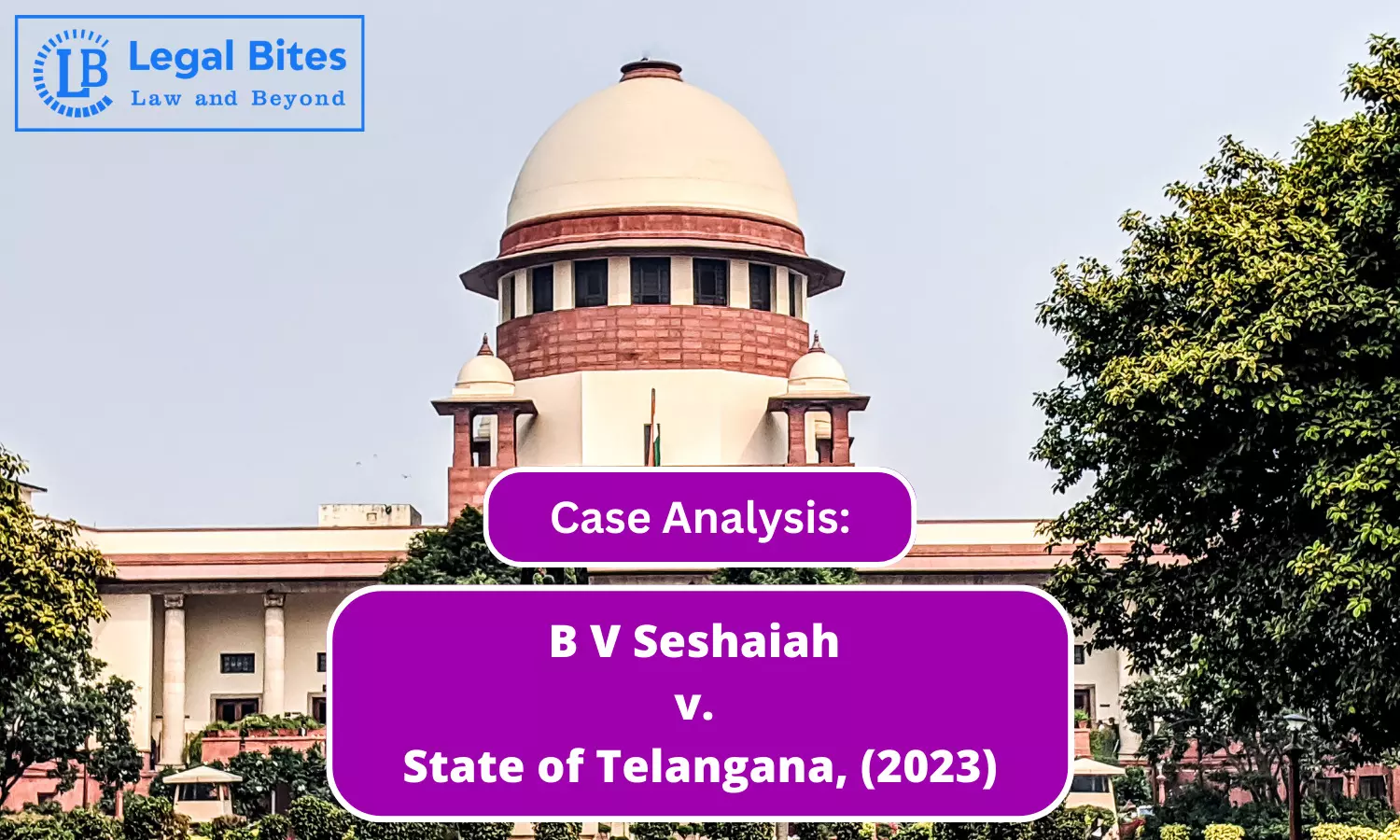Case Analysis: B V Seshaiah v. State of Telangana, (2023) | Conviction cannot be confirmed Overriding Agreement between Parties to Compound the Offence
The Case Analysis: B V Seshaiah v. State of Telangana, (2023) elucidates a remarkable decision of the Supreme Court related to section 138 of the Negotiable Instrument Act, 1881.

The Case Analysis: B V Seshaiah v. State of Telangana, (2023) elucidates a remarkable decision of the Supreme Court related to section 138 of the Negotiable Instrument Act, 1881. Telangana High Court's ruling, which overruled the parties' agreement to compound the offence and confirmed the conviction in a case involving a dishonoured check, was recently overturned by the Supreme Court. When parties to a litigation proceeding have agreed to compound a compoundable offence, the High Courts...
The Case Analysis: B V Seshaiah v. State of Telangana, (2023) elucidates a remarkable decision of the Supreme Court related to section 138 of the Negotiable Instrument Act, 1881. Telangana High Court's ruling, which overruled the parties' agreement to compound the offence and confirmed the conviction in a case involving a dishonoured check, was recently overturned by the Supreme Court. When parties to a litigation proceeding have agreed to compound a compoundable offence, the High Courts cannot overrule such compounding and force their will on the parties, according to a bench made up of Justices Krishna Murari and V. Ramasubramanian.
Case Title: BV Seshaiah v. State of Telangana
Court: Supreme Court of India
Citation: Arising out of Special Leave Petition (CRL) No.7099/2018
Judges: Justices Krishna Murari and V Ramasubramanian.
Date: 1st February 2023
Facts of the Case
The circumstances of this matter are that the Appellants, in this instance, were the subject of proceedings under Section 138 of the Negotiable Instruments Act, 1881, as a result of a private complaint brought by Respondent No. 2 (State of Telangana). The trial court found the appellants guilty as a result of these proceedings.
It is asserted that the appellants stole money from Respondent No. 2 while posing as investors and then illegally turned the money into a profit. The Appellants requested a revision in High Court following their conviction. It's crucial to remember that the parties signed a Memorandum of Understanding to resolve the conflict among themselves during the revision submitted by the appellants. The Memorandum of Understanding's Clause 8 specified that an amicable resolution of the disagreement was required and if the conflict cannot be settled peacefully, it must first be sent to a single Arbitrator.
The following is stated in clause 8 of the aforementioned Memorandum of Understanding:
That any dispute arising under this document shall be settled peacefully. If the disagreement cannot be settled amicably, Shri Jonnalagadda Srinivasa Rao S/o Venkaiah will be the only arbitrator, and his decision would be final and binding on all parties. The lone arbitrator will hear the parties after entering references and issuing a decision. The arbitration proceedings shall be governed by the requirements of the Arbitration and Conciliation Act.
It should be emphasised that Respondent No. 2 was required by the terms of the agreement to submit a compromise petition with the High Court, but he failed to do so. The High Court has now dismissed the Revision and upheld the Conviction of the Appellants due to the failure to file the compromise petition that was agreed upon by Respondent No. 2.
Issues Involved
This is a pretty apparent instance of the parties entering into an agreement and aggravating the offence in order to avoid going through the court procedure.
- The question is whether the High Court can override such compounding and impose its will once such a step has been taken by the parties and whether is it extremely obvious from the legislation that they are permitted to do the same.
Laws Applied
- This is a case of Section 138 of the Negotiable Instruments Act 1881, (which is the dishonour of cheque). Here in this case, the parties' agreement to compound the offence cannot be overridden by conviction. Negotiable Instruments Act 1881 - Section 147 states every offence penalised by this Act must be compoundable, regardless of anything stated in the Code of Criminal Procedure, 1973.
Judgment
- As stated in clause 8 of the Memorandum of Understanding, the parties are required by the terms and conditions of the settlement they engaged in to resolve the matter amicably or through arbitration.
- In this situation, the appellants cannot be found guilty based on the decisions made by the courts below because the settlement just compounds the offence. This court determined the substance of the offence under section 138 of the NI Act is substantially related to a civil wrong and has been particularly made a compoundable offence in the case of M/S Meters and Instruments Private Limited & Anr. v. Kanchan Mehta.
- The relevant paragraph of the judgment has been extracted herein: “This Court has noted that the object of the statute was to facilitate smooth functioning of business transactions. The provision is necessary as, in many transactions’ cheques were issued merely as a device to defraud the creditors. Dishonour of a cheque causes incalculable loss, injury and inconvenience to the Vide the Banking, Public Financial Institutions and Negotiable Instruments Laws (Amendment) Act, 1988 payee and credibility of business transactions suffers a setback. At the same time, it was also noted that the nature of offence under Section 138 primarily related to a civil wrong, and the 2002 amendment specifically made it compoundable.”
- This is a very clear example of an agreement being made and an offence being compounded by the parties in order to prevent litigation. The High Court cannot override such compounding and impose its will when the parties have taken such action, and the law very plainly permits them to do so.
- It should be observed that Respondent No. 2 was required to file a compromise petition before the High Court and that by failing to do so, he withdrew important material from the High Court, which caused the conviction of the appellants to be unjustly confirmed.
- Consequently, the court grants these appeals and vacates the trial court's judgement of conviction. The parties are nevertheless free to resolve their disagreement in accordance with the MOU's conditions.
Important Links
Law Library: Notes and Study Material for LLB, LLM, Judiciary, and Entrance Exams

Ananya Kukreti
Ananya is currently pursuing law from Amity University, Noida. She has a strong inclination towards policy research and business laws.

